FOCUS
ON NOTIONS OF WAR
We talk to expert Dr Shelest about Georgia's approach to the war, Misha Saakashvili, and the cold winter ahead for Ukraine PAGE 4

We talk to expert Dr Shelest about Georgia's approach to the war, Misha Saakashvili, and the cold winter ahead for Ukraine PAGE 4

Overall, Georgia continues to fulfil the visa liberalization benchmarks and has taken action to address the Commission’s previous recommendations, – reads the fifth report on the EU visa-free regime with Western Balkans Eastern Partnership countries.
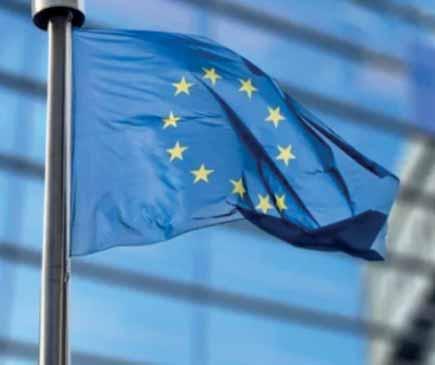
The document reads that despite the above, efforts are needed in visa policy and fighting money laundering and organized crime.
As the document notes, Georgia should further address the following issues:
a) Align Georgia’s visa policy with the EU’s list of visarequired third countries, in particular those third countries presenting irregular migration or security risks to the EU.
b) Continue to address unfounded asylum applications in Member States; tailor information campaigns on the visa-free regime to relevant migrant profiles, including vulnerable groups, those remaining beyond the period for which entry was granted (overstays), and those making unfounded asylum applications.
c) Increase efforts to tackle corruption, in particular the role of large-scale vested interests and their influence in the economic and political spheres, in particular by strengthening the independence and coordination of anti-corruption institutions as well as providing them with necessary resources.

+0,9%+6,1% AZN / USD1,6977 +0,0%+0,1% MSCI FM2 141,16 +2,3%+8,9% AMD USD394,4000 0,2% 0,2%

The war shows no signs of slowing down, with heavy missile attacks continuing in the south and east of the country.
The latest wave of strikes comes after three Russian airbases experienced attacks this week. Kyiv has not claimed responsibility for the attacks, however, some of which have been located hundreds of miles within Russia.
Pro-Russian official Denis Pushilin, the acting head of the separatist “Donetsk People’s Republic” in eastern Ukraine, told Russian state media Tuesday that Russian troops are in a position to advance in Donetsk, arguably the most hotlycontested region in the Ukraine war at the moment.
Fighting there has descended into bloody trench warfare with fierce battles over local settlements as Russian troops attempt to encircle and capture Bakhmut, and Ukrainian forces try to hold them back.
The war in Ukraine, which Russian President Vladimir Putin calls a “special military operation,” will “be a long process,” he said during a televised meeting
Source: Time Magazineon Wednesday. After months of veiled nuclear threats, Putin defended Russia’s nuclear policies. While the threat of nuclear war has risen, “we have not gone crazy, we are aware what nuclear weapons are,” Putin said, adding that Russia’s nuclear strategy is centered on “retaliatory strikes.”
people to evacuate now, they should be ready to do so.
“Kyiv might lose power, water, and heat. The apocalypse might happen, like in Hollywood films, when it’s not possible to live in homes because of the low temperatures,” Mayor Vitali Klitschko told Reuters in an interview. “But we are fighting and doing everything we can to make sure this does not happen,” he said.
The European Union proposed travel bans and asset freezes on almost 200 more Russian officials and military officers as part of a new round of sanctions aimed at ramping up pressure on Moscow over its war in Ukraine.
The proposals were made by the EU’s executive branch, the European Commission. They must still be debated and endorsed by the 27 member countries, a process that routinely results in the commission’s suggestions getting watered down.
The targets of the latest recommended sanctions include government ministers, lawmakers, regional governors and political parties.
“This list covers key figures in Russia’s brutal and deliberate missile strikes against civilians, in the kidnapping of Ukrainian children to Russia, and in the theft of Ukrainian agricultural products,” European Commission President Ursula von der Leyen said in a statement.

Time Magazine named Ukrainian President Volodymyr Zelensky its Person of the Year, awarding him the accolade “for proving that courage can be as contagious as fear.”
Editor-in-Chief Edward Felsenthal said the choice of Zelensky, alongside “the spirit of Ukraine,” was “the most clear-cut in memory.”
“Whether the battle for Ukraine fills one with hope or with fear, the world marched to Volodymyr Zelensky’s beat in 2022,” he said.
Felsenthal said Zelensky’s decision when the war started “not to flee Kyiv but to stay and rally support, was fateful.”
“For proving that courage can be as contagious as fear, for stirring people and nations to come together in defense of freedom, for reminding the world of the fragility of democracy, and of peace, Volodymyr Zelensky, and the spirit of Ukraine, are TIME’s 2022 Person of the Year,” he said.
‘APOCALYPSE’
IS POSSIBLE, BUT URGES CALM Kyiv’s mayor on Wednesday warned of an “apocalypse” scenario for the Ukrainian capital this winter if Russian air strikes on infrastructure continue, and said that although there was no need for
Following the promotion of General Sergey Surovikin to the post of Commander of All Russian Forces in Ukraine, Kyiv witnessed a change in tactics.
On October 10, waves of cruise missiles and “kamikaze” attack drones filled the skies over Ukraine’s cities as the so-called “General Armageddon'' ordered one of the largest missile strikes in the war. However, these munitions were not hurtling towards military bases, forward fighting positions, or even supply depots: They were headed for the civilian city centers.
In the weeks that followed, more waves of missiles struck civilian infrastructure hubs across the country. According to Ukrainian President Volodymyr Zelensky, around six million people are suffering with outages of electricity, heating, and water. Despite massive efforts by Kyiv, as well as NATO and EU allies, to curb the effect of these strikes, the looming winter stands to take an immense toll on the already shaken Ukrainian people.
While the effect of these missiles against military targets may halt or slow any Ukrainian advances on the battlefield, their application against civilians will not.
In fact, there has been little to no observable effect on Kyiv's military ambitions.
So the question is: Why does Russia openly fire on civilians, and can it force the country to capitulate using this tactic?
The concept of targeting the civil foundation that supports the military apparatus is something that became a formal component with the advent of aircraft and strategic munitions. While some examples exist in the First World War, it was WWII that saw this become doctrine for both sides. The concept of “strategic bombing” was modernized, using aircraft and missile assets to destroy the enemy’s ability to produce, sustain, and train military forces. However, the dark cousin to this tactic is terror bombing - the targeting of civilian centers to reduce and destroy the morale of one’s foe.
This twisted approach to strategic bombing targets not only production facilities and economic hubs, but also puts shopping malls, markets, and housing blocks in the crosshairs in an attempt to push the population to an anti-war sentiment. This sentiment is supposed to convince national leadership to sue for peace, or at least come to the negotiations table with a disadvantage. Thus, Russia is directly and indirectly attempting to bomb, restrict, and ultimately freeze the Ukrainian people into submission.
Continued on page 4
d) Finalize efforts to fully align national legislation with the EU acquis on antimoney laundering and counterterrorism financing.
e) Step up efforts against organized crime, especially the networks connected to operations in the EU.
f) Fully align the procedure for appointing Supreme Court judges with the Venice Commission’s recommendations, and adopt and implement legislation evaluating the integrity and performance of Supreme Court judges.
g) Ensure the independence of the data protection authority.
According to Klitschko, 152 civilian residents of Kyiv have been killed and 678 buildings destroyed since the beginning of Russia’s invasion on February 24, but the city faces fresh tribulations this winter as Russia regularly pounds Ukraine’s power grid with missiles.
With a fresh raft of sanctions, the commission also intends to target the Russian defense industry and more Russian banks, and to impose export controls and restrictions on products like chemicals, nerve agents, electronics and IT components that could be used by the armed forces.
The magazine also highlighted people said to “embody” the spirit of Ukraine. They include engineer Oleg Kutkov, who helped keep Ukraine connected; Olga Rudenko, editor of the Kyiv Independent; and British combat surgeon David Nott.
The European Commission on Wednesday proposed a ninth package of sanctions on Russia over its invasion of Ukraine that would include almost 200 more individuals and entities on the EU sanctions list.
Commission President Ursula von der Leyen said it favored new sanctions against three additional Russian banks and new export controls and restrictions, especially for dual-use goods like key chemicals, nerve agents, electronics and IT components.

Russia “continues to bring death and devastation to Ukraine and is deliber-
ately targeting civilians and civilian infrastructure, seeking to paralyze the country at the beginning of the winter”, she said in a statement.
She added that the eight packages of sanctions the EU had introduced so far are already biting hard and now the bloc wanted to raise the pressure on Russia with a ninth package.
Sanctions require the unanimous backing of all the bloc’s 27 member states, but most of the measures proposed in the first eight packages were approved by their representative European Council within weeks, though some were dropped or watered down.
The eighth package was approved on Oct. 5 and included more trade restrictions and targeted more individuals.
Von der Leyen said new individuals and entities proposed for the sanctions list included the Russian armed forces as well as individual officers and defense industries, members of the Russian parliament’s State Duma and Federation Council, ministers, governors and political parties.
“This list covers key figures in Russia’s brutal and deliberate missile strikes against civilians, in the kidnapping of Ukrainian children to Russia, and in the theft of Ukrainian agricultural products,” she said.









THE GEORGIAN PEOPLE, INCLUDING THE GEORGIAN FIGHTERS THERE.
You know, Ukrainians clearly differentiate between these groups. Ukrainians highly appreciated all those demonstrations that happened in Tbilisi; they were praised, there was gratitude, that was tremendous. It was discussed everywhere.
The Georgian Legion in Ukraine- the Georgian fighters are highly praised as well. They're well respected, they are not newcomers. There was a generation who came in the 1990s. But like in Odessa, we’ve had Georgians since the 19th century, many famous names who influenced the capital, making these Georgians part of our nation as well.
opened its doors.
For me, it’s not about Ukraine, it’s about the risks this brings to Georgia. First of all, why was a 100,000-strong population of dubious positions allowed in, especially when you also have a huge amount of Ukrainian refugees. That means you will have conflicts between these two groups. What will you do? You are a small country, you will not be able to accommodate such an amount of people. They will have an influence and who knows how many Russian agents are among them? It's like a ticking bomb, and the question is when it will be triggered, not whether it will explode.
they're not aware of the real situation, or want some hype.
IN ODESSA WHO SHAPED THE CITY'S HISTORY AND DESTINY, THE MOST RECENT ONE WOULD BE GEORGIA’S 3RD PRESIDENT, MISHA SAAKASHVILI. WHAT IS HIS LEGACY IN UKRAINE?
INTERVIEW BY VAZHA TAVBERIDZE FOR RFE/RL
Dr. Hanna Shelest is the Security Studies Program Director at the Foreign Policy Council “Ukrainian Prism” and Head of the Board of the NGO “Promotion of Intercultural Cooperation”. Prior to this, she served for more than 10 years as a Senior Researcher at the National Institute for Strategic Studies under the President of Ukraine, Odessa Branch. The RFE/ RL Georgian Service kicked off our interview with her with the hard winter Ukraine is now facing.
“A little bit of good news in this is that the road will be frozen so there is less mud,” she tells us. “Now we have rain and fog that complicates the movements of the forces. Both Ukrainians and Russians are experienced with such winters, but the Ukrainian armed forces are much better prepared than the Russian in terms of uniforms, because we started to produce and request winter uniforms back in summer. Canada alone delivered 100,000 quality winter uniforms. At the same time, the international media reports how the Russian troops are physically freezing because they don't have any such supplies. There are rumors Chinese supplies are coming in, but time really matters.”
THERE ARE ALSO RUMORS UKRAINE COULD BE SUPPLIED WITH THE PATRIOT DEFENSE SYSTEM. HOW MUCH OF A GAME-CHANGER WOULD THAT BE?
Seeing what the Russians are doing now, the most important thing is to boost our
air defense. Where HIMARS were needed to target Russian ammunition depots, now Patriot can help us in the same way as IRIS helped, as did other types of equipment that we received from our partners. And that means the Russian attacks will be less successful.
There is certain ammunition that has become historically symbolic. Like HIMARS, like Javelins before. Along with HIMARS, we’ve also received British, Turkish and French systems, with almost the exact same characteristics, but everybody talks about HIMARs because they're symbolic. Patriot is also a symbolic weapon that everybody has heard about, that is something big and to be afraid of. That's why it is so frequently mentioned in Russian propaganda these days.
OUR INTERVIEW IS TAKING PLACE IN TBILISI- “CITY OF PEACE,” ACCORDING TO THE FRESHLY MINTED SLOGAN FOR THE CAPITAL OVER NEW YEAR. IT WAS PERCEIVED IT AS A THINLY VEILED DIG AT UKRAINE. DO YOU SHARE THAT SENTIMENT?
You know, I see it as black humor, and not even for Ukraine, but for Georgia itself. Because the city of peace can be Geneva or Vienna, where we signed most of the documents, but for a country that is still at war to this day, as Georgia is, it sounds a little bit odd, I think. And if the locals agree with it, fine, but we know how the Georgian population feels, and, in this way, we totally share their position.
LET’S TALK ABOUT GEORGIA’S ROLE IN THIS WAR. AND LET'S DIFFERENTIATE BETWEEN THE GOVERNMENT AND
But when you speak about the Georgian government, it still raises a lot of brows. There is a clear absence of understanding or acceptance of the behavior of the Georgian government. We see there are different positions, even within the ruling party, and we understand that there are debates. The Ukrainians could more or less accept the issue about the sanctions, even that the Georgian government was extremely bad at communicating on the issue. We know that Georgia joined the European sanctions, so it is not violating these sanctions; it just didn't apply some national ones. Moldova did the same, but we don’t ask Moldova “why?” as they had good communication on the issue. The issue of what is happening now, with the acceptance of so many Russians into Georgia, that is something that really brought total misunderstanding.
What really shocked us in the beginning, when monitoring Russian social networks and online media, was when we noticed how many Russians were just standing at the border with Georgia and discussing whether they should take the Z symbol off their cars. These people were running to Georgia not because they were against the war, but because the war is nice on TV but they didn't want to be in the armed forces fighting in it. So it means that these people are bringing to Georgia all these pro-war sentiments. Some are bringing pro-Putin sentiments as well, and many of them, as soon as they were not allowed to cross with this Z symbol, started not just to complain about Georgians, but became openly fascist in their statements. And then Georgia generously
TBILISI HAS ACCUSED KYIV OF TRYING TO DRAG IT INTO AN OPEN CONFRONTATION WITH RUSSIA. AND OBJECTIVELY SPEAKING, THERE HAVE BEEN QUESTIONABLE STATEMENTS FROM SOME UKRAINIAN POLITICIANS. EVERYBODY CAN UNDERSTAND GEORGIA IS IN NO POSITION TO GET INVOLVED IN ANY WAY, SHAPE OR FORM. SO WHY TRY TO POKE IT WITH A STICK?

First, Georgia is in this war already, because what is happening now is a continuation of 2008. In the big picture, it’s not at peace with the Russian Federation, the negotiations are not over, Abkhazia and South Ossetia are still under occupation, it has creeping borderization. You cannot say you are safe and at peace. So to say that we are trying to drag you in sounds a little bit strange, because just a few years ago, Georgia’s diplomats in the international arena were always speaking about uniting our cases, asking why we were not speaking with a single voice. It seems to me this current accusation is open manipulation from the Georgian side, because we are not dragging anyone: You were there first.
Yes, there were several statements from Ukrainian politicians, but not influential politicians in terms of forming the foreign and security policy. And not officials, just politicians who said that Georgia needs to use this moment and open a second front. This was highly criticized inside Ukraine, by the expert community, by the diplomats. Ukraine is not the aggressor nation, we didn’t start this war, we are not going to take Russian territory, we are not calling anybody to military action. That was definitely irresponsible from those who stated it, but you always have somebody saying stupid things, because
It's a very contradictory area, because there was a lot of PR around his moves. A lot of people in Ukraine hoped that we would get the Misha of 2005, the Batumimaker and the reformer, but Ukraine received the Misha of a later time, when PR and publicity were more important than reforms. And also, while in Georgia he was the president, in Ukraine, he was just another politician. But he inspired a lot of people. He does it well, let's be honest. Some of these people are now in politics and doing very well, the younger generation who believed in themselves, really good Members of Parliament, coming from those who came with him. He brought a lot of good Georgians to Ukraine, who are still helping the Ukrainian state in many spheres.
It's not black or white, for sure. What happened later, we understand that he couldn't find his exact place, and he was very divided between Georgia and Ukraine. I mean, that's natural. That's understandable. But he was caught in the trap of this division between two countries.
I am afraid he doesn’t. He wanted to be a leader, not just a member of the parliament, and so he created his own political party, but they didn’t get a lot of votes. He is still a man of one personality, and Ukraine is now trying to have more parties where you have several leaders, not just a single person.
That said, he can definitely have certain opinion-making influence in the country. I am not sure that would count as political influence. I don’t see him in a toplevel position in Ukraine, but I can see him in charge of some big reconstruction fund, something that can have impact, influence, maybe something needing innovation, but at the same time, something that would free him from bureaucracy, because he’s quite bad with the frames that come with it.
Continued from page 2
In Russia’s ideal, the Ukrainian people, tired of their relatives dying on the front line as well as their own lives being in danger, would act out, and, whether through popular uprising or forced snap elections, the Zelensky administration would be ousted, a new leader would emerge that would seek a peace deal, and the Kremlin could claim victory. Additionally, the new leadership could be molded into something Moscow could control.
This may answer why Russia is targeting the Ukrainian civilian population. However, this only leads to the second question: Can this technique actually work? Will Kyiv bend to Moscow’s will and separate from the West and NATO?
A look at history may shed light on this.
Often referenced by pro-Kremlin social media accounts, the actions of the Allies in WWII against Germany and Japan were the most notable strategic bombing campaign. The firebombing of Tokyo, Dresden, Hamburg, and many other raids leveled cities and resulted in hundreds of thousands of civilian deaths. Hiroshima and Nagasaki, the two sites of America’s first nuclear weapons detonations, laid a precedent that still rings across the proRussian military analysis community today.
Conversely, the air mission into Great Britain by the German air force, the Luftwaffe, was targeted at bringing the island nation to its knees and halting any support for its campaigns in Europe. Even with the devastation in London and other cities, the people felt a sense of solidarity with their countrymen fighting across the Channel. When Germany introduced its new cruise missiles, the V2 rocket program, this did little to chip away the Brits’ passion for victory.
The actions of the United States Air Force in Vietnam continued this tactic of attempting to bomb the citizenry into submission. To the contrary, popular support for the North Vietnamese forces soared during the mass bombing operations in the country. Recruitment for the armed forces and guerilla groups increased as more attacks ravaged the countryside, causing the US and allied forces to face increasingly more dedicated resistance on the ground.
In all these examples, the attempts at a munitions-based approach of forcing the people into capitulation became a hopeless dream. Russia has used hundreds of its valuable and expensive precision missile technologies, millions of dollars trying to replace them, and even more trying to imitate them with cheap Iranian ersatz versions. With so much of history indi-
cating that this tactic is a lost cause, Russia’s more recent history in Syria shows why they still believe in this methodology.
General Surovikin, as well as much of the Russian military’s officer corps, gained their combat experience from being deployed in Syria. A part of the deployment against the Islamic State as well as the enemies of Syrian President Bashar al-Assad, the tactic of bombing cities and settlements came out of necessity. The Russian military, unable to combat an asymmetric force like the Syrian rebels with conventional force, and unwilling to develop a counter insurgency model like the United States and NATO, resorted to blunt force.
Since the rebels were intricately woven into the communities that supported them, there was no distinction between armed insurgents and civilians. Bombing included hospitals to curtail the return of wounded enemy fighters, markets to throttle their supplies, and villages and towns to remove their supporters. Despite the sheer brutality and horror of this campaign, it worked. The overarching objective of keeping al-Assad in power was achieved, something many military analysts agree would not be possible without such foreign intervention. However, Ukraine is not Syria. The Kremlin, applying a one-bomb-fits-all
approach to the problem, failed to recognize the overt differences between the two. In Syria, Russia faced an irregular force, with almost no technological sophistication, no air force, and little in the way of mechanized armor forces.
In addition, the Syrian anti-government and pro-democracy armies received very little from foreign countries, aside from small arms shipments that came few and far between.
Ukraine couldn’t be more of a polar opposite. Kyiv had spent years since the first incursion in 2014 modernizing and retraining its forces. The Ukrainian Armed Forces had virtually reinvented its battlefield management and command model with help from NATO. After the invasion, the Kremlin likely never thought they would have to contend with the armory of Europe, Australia, the United States, and the United Kingdom coming to bear in Ukraine’s defense.
As a result, the Russian military, again incapable of innovation or creativity, resorted to the same clockwork routine of irreverent bombing and crude missile strikes. With the observable inability to defeat the Ukrainian forces on the battlefield, the Kremlin has settled on killing innocent people in their homes and claiming this, in some way, warrants a military success.
Ultimately, the answer to the aforementioned question is a resounding ‘no’. Russian command cannot hope to win this war by attempting to bomb the population into forcing Kyiv to capitulate. Ukraine has already firmly made its position clear that defeat is not an option. With more major defeats than significant victories, the Kremlin is running short on its own options. As the popular online saying goes, “the Russian army was thought to be the second best in the world. It turns out it's only the second best army in Ukraine.”
The liberal idea was built around and influenced by the Westphalian concept of state sovereignty. But increasingly the modernday liberal expansion undermined a core Westphalian idea of pluralism of political and ideological systems. Even if the Western leaders were more considerate in their foreign policy actions and less eager to extend liberalism deep into Eurasia, where its tradition was sparse or non-existent, the unipolar moment was still bound to experience troubles. Even the moderate spread of liberalism causes nationalism, questions the very idea of state sovereignty, and the high pace of globalization incurs the loss of countless industry jobs in the West. Another way of explaining the present troubles within the liberal system might be that the liberal order is in the process of adapting. More than three decades have passed since the end of the Cold War and after the initial euphoria of the “end of history,” there might be an overextension. While previously it was nestled on mostly the western parts of the European continent, North America, Australia, New Zealand, and some other parts of what we nowadays call the IndoPacific realm, the liberal order made huge territorial inroads into the heart of Eurasia after the end of the Cold War.
Though great Eurasian civilizations historically have not been immune to Western influence of some sort, they always resisted its cultural, political, and economic influence. Thus what nowadays Russia, Turkey, Iran, China, and even partially India do to resist Western multilateralism should come as no surprise.
It is, however, startling to see the power these countries now possess and the level of cooperation they now enjoy.

Their strength is rooted in the near uniform spread of technological prowess, i.e. the modernity and economic benefits across the world. In the 21st century, that modernity empowers both the liberal and illiberal camps, and this constitutes a fundamental break with the past when progress and liberalism went hand in hand and were almost exclusively confined to the West. Thus America-led liberal internationalism brought about largest benefits for the world overall, enabling large but poor states to turn into major regional or world players. This also planted seeds for effective resistance to liberal ideas and America’s geopolitical vision.
From a historic perspective, this could be cast as a continuation of the struggle between the sea and land powers. Sea powers, liberal democracies, though unable to outcompete militarily the Eurasian land empires and change their state-building patterns, mostly resort to influencing their rivals’ behavior, constraining their ability to unite or influence Eurasia in its entirety. It is no coincidence that the world’s greatest democracies were the lands hard to reach: The British Isles and the US.
Development of democracy took much longer in continental Europe, and failed to take root in Asia because emerging liberal forces were often smashed outright or contained by the neighboring autocratic land empires.
Sea powers possessed technological prowess, but their potential was often checked by continental powers’ far greater human and natural resources. And this is where the critical difference between modern and previous challenges to the West stands. The America-imposed liberal system allowed a more or less even diffusion of economic benefits and technological knowledge. Now powerful continental illiberal states are technologically advanced, coupled with astounding human capital and a natural resource
base. They are increasingly tilting toward greater cooperation among themselves to confront the collective West.
There is also a problem of increasing incongruity between the social contract which was a basis of the modern liberal system and the decreasing benefits it currently brings to the order’s leading members. The liberal order has been built through agreements and organizational structures. However, those very fundamentals which ensured the efficacy of multilateralism have lately been thinning out.

Mutual military protection and social advancement have stopped working, as, nowadays, it has become increasingly difficult for Western societies to grasp the traditional inter-connection between liberal internationalism and progress at home. There is also a growing sentiment that the order has been more beneficial to other parts of the world. Some of this thinking is correct. The global financial meltdown of 2008 brought about greater economic inequality, which in turn caused protectionist and populist tendencies
across the world to scale back the pace of globalization.
But as much as the crisis is real and markedly different in gravity in comparison with previous challenges, picturing the coming end to the liberal idea could be a hastily reached conclusion. Liberal internationalism is surprisingly resilient. It has been made and remade by various historical painful processes filled with both successes and failures, but it nevertheless points to the idea’s flexibility.
The liberal idea proved especially resilient and progressive in times of grave challenges, such as the Nazi and communist menaces. Even now, liberalism’s elasticity and attractiveness are evidenced by a number of states of various sizes and in different regions becoming part of the order. True, some evolve into imperfect democracies (as in the case of eastern European and the South Caucasus states), but large parts of those countries’ societies nevertheless embrace the liberal idea and strive for improvement in governance. Larger failures hap-
pen too. In case of China and Russia, liberal attractiveness has not worked, and even produced radically opposite results as both states are building their institutions increasingly based on antiliberal ideas. Liberalism, despite its internal contradictions, is nevertheless a more benign formula than any of its alternatives. The idea is also attractive as it aspires and successfully carries out a relatively even spread of economic benefits among its participants.
Indeed, the elasticity of the liberal order was proved when Russia began a fullscale invasion of Ukraine in February 2022. The thinking in Moscow was evident: The liberal order is not only weak, but it actually experiences fundamental troubles and it is only a matter of time until it finally breaks down. Perhaps Putin thought he could even nudge it a bit in this direction and thus accelerate the demise of the liberal system.
Emil Avdaliani is a professor at European University and the Director of Middle East Studies at the Georgian think-tank, Geocase.
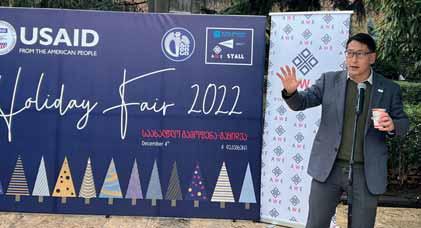
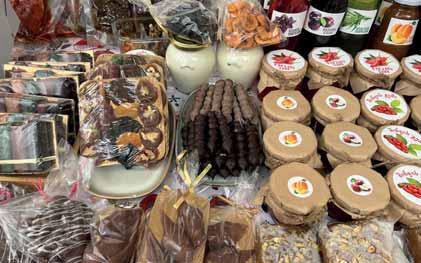
around the world because the economic empowerment of women is critical for economic growth: economic growth is more sustainable when it includes the participation of everyone. It’s also important for democratic development: when women participate in the economy, studies have shown they are more likely to participate in democracy, making a country more reflective of the people who live there and making that democracy stronger.
The USAID Holiday Fair held last weekend in Dedaena Park united more than 120 entrepreneurs from across Georgia. The entrepreneurs were participants in USAID programs that support youth and women entrepreneurs and also Georgia’s agriculture sector. These programs are part of USAID’s 30-year commitment to make Georgia more prosperous and to make sure that prosperity reaches the people of Georgia, including women, in every corner of the country.
Members of the Georgian Heritage Craft Association and AWE (Association of Women Entrepreneurs), which have received support from USAID, also participated. In addition, the fair hosted entrepreneurs from the charity organization reWoven, which supports women in Azerbaijani-minority villages in southern Georgia by helping them weave the traditional carpets that have been a crucial part of their culture for centuries.
“USAID was proud to see so many entrepreneurs supporting themselves, their families, and their communities at the event, and we were very happy with the number of visitors to the fair, supporting these entrepreneurs despite the weather,” Marika Olson, Economic Growth Office Director, USAID/Georgia, tells GEORGIA TODAY.
We asked her about the main activities
of the event and the opportunities it provided to the women entrepreneurs.
“The entrepreneurs and artisans came from across Georgia. They are women and men of different ages making a diverse array of products,” she says. “The fair was open to the public and provided an opportunity for handicraft artisans and food producers to sell directly to a wider audience than in their home communities.

“It was an excellent opportunity for visitors to do their holiday shopping and a great chance for women entrepreneurs to establish business relationships through direct networking with the public–and to make money by selling their goods.


Many of the entrepreneurs that have participated in previous fairs arranged by USAID have established connections to further access local and even international markets.”
USAID invests in Georgia’s women entrepreneurs to help them develop sustainable, profitable businesses that allow them to support their households. Some even provide employment opportunities for others in their communities.
USAID supports women entrepreneurs
USAID supports women entrepreneurs across Georgia with access to finance, training, and networking opportunities such as this fair. Women are educated in enterprise management, and get mentoring and coaching support based on individual needs. Since 2015, USAID has supported more than 1,700 young entrepreneurs with business training and has financed 90 startup businesses.
US ABOUT THE WORK DONE BY USAID RECENTLY FOR THE ECONOMIC EMPOWERMENT OF WOMEN LIVING IN RURAL AREAS AND THE PROGRESS ACHIEVED IN THIS REGARD.
USAID supports rural women entrepreneurs and equips them with business management, leadership skills, and financial literacy. More than 1,300 rural women across Georgia have already received training and become leaders in their communities by successfully managing their businesses. In addition, women entrepreneurs participate in Women Entrepreneurs’ Workshops that focus on personal growth, developing self-confidence, leadership, effective communication, networking, budgeting, financial planning, and customer development. Workshop participants establish strong contacts with each other, exchange valuable experience and knowledge, share lessons learned, and plan future activities.
USAID supports women’s participation in a wide variety of professions, including women owned startups, and expands operation of women owned businesses. This includes tourism, handicraft production, and agriculture.
USAID has also partnered with UN Women to eliminate job-related stereotypes and increase women’s participation in highly paid jobs such as technology or construction. For example, we just launched a partnership with Business Technology University to establish eight coding schools for young women outside major cities. More than 1,500 young women will be trained and get jobs in the highly demanded ICT field.
By 2024, USAID will provide more than 2,600 women with access to finance, training, and marketing opportunities. USAID will finance more than 40 womanowned startup businesses and support them with mentorship and coaching. In addition, USAID plans to hold more women entrepreneurship fairs in the future, so stay tuned!
USAID supports women through other activities as well. Our “Girls for Change” inspires and educates future female leaders and encourages the business community to proactively engage in women/youth empowerment activities. In addition, as part of its work to empower women to engage in local policymaking, USAID issues grants to local organizations to strengthen women’s advocacy skills and inform them about critical economic reforms.

The quality of toys is one of the most important issues that many people are interested in in Georgia. The availability of high-quality toys is not big in Georgia, because they are only sold in branded shops and the prices are high.
Many people still do not know that on the 3rd floor od Tbilisi Mall is located new, extremely large-sized shop of WISHLIST. There you can find large variety of international toy brands with EN71 certification. This is Wishlist’s Baby Universe – company that has been offering its customers high quality toys and always increasing product variety for last 6 years.
The offers by Wishlist.ge is gaining increasing popularity during pre-new year period. At this time of year every-
one wants to chose best possible distinguished gift to their children. Wishlist has taken this into consideration and nowadays the showroom of Wishlist is best then ever – offering huge product line.
Wishlsit.ge has been operating for 6 years and it has been 5 years since the company has been offering the market their own imported toys. In this business Wishlist is a market leader, offering everything needed from newborn to teenager – strollers, car seats, high chairs, battery operated cars, bed, toys, etc..
In Wishlist all the products are made in accordance of European pediatricians’ recommendations and every toy is designed for specific age of the child. This brings not only entertainment but also education to the child. The toys that are represented in Wishlist are designed to
develop children’s creativity, imagination, fantasy, coordination – thus to make playing process more effective and fruitful. In the mega-shop you can see the brands
as: Hasbro, Hot Wheels, Mattel, Barbie, Play-Doh, Dede, Art & Craft, Moni Toys, Pilsan, Baby Alive and many others.
High quality toys must have EN71 cer-
tifi
cate, that means that coloring pigment is anti-allergic and the plastic doesn’t contain lead and other toxic ingredients. Each branded toy has unique certification document where all this information is written in details. The certificate consists of 50-60 pages where the results of certification is displayed by the code of the certain item.
When looking for high-quality item it is extremely important to purchase it in well-known shop. In this case the shop is responsible for the quality of the offered toy and it cares about their customers in long term – increasing the number of loyal customers. One must always consider the age group that is written on the certain toy. Wishlist also offers toys for 0–6-month toddlers. This group of toys is very hard to find nowadays in Georgia.
Although widely spread in mountainous regions of Georgia, livestock production is currently generating one of the lowest incomes from all livelihood activities conducted in rural areas, and thus it does not contribute much to the socio-economic development of those areas. To address this problem, since 2022, Caritas Czech Republic works on a project that aims to increase the income of the farmers living in the Tusheti and Pshav-Khevsureti area, and Khulo municipality by changing their practices, related to livestock breeding and feeding, animal health, and pasture management, towards more sustainable and productive ones.
In the framework of the project, the organization works on improving local farmers’ access to the market through business development, increasing sanitary and bioSecurity standards, and strengthening linkages to buyers and finances.
To learn more about the terms of sustainable agriculture development in Georgia, and what kind of challenges and opportunities the country is facing, GEORGIA TODAY sat down with Caritas Czech Republic’s Project Expert Anzor Gogotidze.
He explains that while sustainable agriculture encompasses many things, the project itself focuses on cattle farming, in this case, sustainable cattle farming, and includes using not only grazing land but also a number of other issues related to veterinary services, animal wellbeing, nutrition, etc.
"In Georgia, we do not have grazing land- such a term is not recognized by Georgian legislation. After the collapse of the Soviet Union, and the destruction of the structures, the population, especially in mountainous regions, regulated this issue with historical memory, meaning certain pastures belonged to the village,” Gogotidze tells us.

In the 1950s, when the Soviet farms were formed, Tusheti was turned into a single large pasture, and this direction was determined by sheep breeding, as well as, to some extent, cattle farming.

After the collapse of the Soviet Union, when the state farms were disbanded, the population itself, on the basis of memory, set the borders between certain villages.
"A similar process developed in other regions of Georgia- meadows near the village are called village pastures, and the local population uses it as pasture, although it is not legally allocated to the
village,” the expert explains.
“Now a big project is underway in Georgia with the help of FAO, and a pasture management policy document is being drafted, based on which the relevant law should be refined, and to some extent, this rural pasture as a form of social benefit can already be legalized, although there are many problems on the agenda, for example, the matter of management, how the village pasture should be managed. As noted in existing legislation, the pasture can be leased, if it is state or municipal property, in the form of an auction, in which not only the village residents can participate, but also any interested legal or physical person, and it can happen that the pasture no longer belongs to a village. and it might be owned by a legal or physical person who has not had any contact with that village until then, but has a certain agricultural/economic interest in this pasture,” he says.
To solve this problem, adopting the French experience seems to be the best fit, where associations of grazer users are formed and these associations become lessees of this pasture. The founders of this association are local pasture users, and they themselves make decisions based on the pasture management plan.
All villages have these pastures, although this is also a subject of conflict between the state and the local population. For example, where the National Property Management Agency manages most of the pastures today, 3% of the pastures have been transferred to the municipalities. They can lease these pastures, but they are not for sale, and there are very few privately owned pastures in Georgia. However, we do not even know the price of the land. At this stage, various state programs are working to determine what the area of agricultural plots is, including the area of individual plots, so as to be able to register the existing plots and determine what the region has in the form of such great wealth as land.
Pastures in the country are managed, neither properly, nor in general. Herdsmen manage the grazing system based on old knowledge, which does not rely on scientific information. There are often cases that the population refuses to accept new knowledge- they think the understanding they have inherited from their ancestors is the only solid and right one.
The pastures that we have are degraded, and productivity is low. This is more obvious in the mountainous regions, where landslides and erosion develop naturally, not only as a result of grazing but through wind and water erosion. Our agriculture today is mainly exten-
sive, meaning in order to increase the number of products produced, we do not increase the productivity of the animals, but increase their fertility, and we think that this is the only way to get more products and income. Ultimately, this leads to the development of negatives, like land degradation, and so on, which are related to the country's food security. It is an important issue when the global population now stands at 8 billion.

A productive pasture means that we have highly productive livestock, we produce more products with fewer labor costs, the farmer gets more income, the quality of life increases, one no longer runs away from the country and there is no shortage of milk and milk products in the country. Especially in recent years, the prices of milk and milk products have increased significantly.
Gogotidze emphasizes the importance of implementing rotational grazing practices. He recalls his experience while working in Tusheti, where several pilot plots were organized so as to see how the rotation grazing of the plot would work. For this purpose, they used electric fences and as he remarked, the plot was very successful. As a result, the local population realized its importance and started introducing electric fences in other villages of Tusheti, particularly on the winter pastures. Electric fences are now widely used in Georgia and are no longer an innovation, but a developed practice.
"Within the Caritas Czech Republic project, the principle of rotating grazing using electric fences will be implemented in three mountainous regions of Georgia: Tusheti, Pshav-Khevsureti, and Khulo municipality," Gogotidze tells us.
“As a result of the project, the number of beef-producing farms following sustainable and more productive cattle farming practices will increase, the selected farmers will get better access to the market, and their income will increase accordingly. Moreover, Georgian farmers will have an opportunity to get acquainted with the Czech knowhow of precision agriculture through B2B matching events for Czech and Georgian agro-companies,” he adds.
The organization has been working in the direction of rural development for years and this project is another step forward.
Their work is far from over, and Georgian farmers have nothing but benefits to reap.
This material was prepared in the scope of the project financed within the Official Development Assistance of the Czech Republic and implemented through the partnership between the Czech Development Agency and Caritas Czech Republic.
There are 12 tables, 12 projects and the same number of teams. Each team has 4 or 5 members from the schools of Tbilisi, Akhaltsikhe, Kutaisi, Senaki, Batumi and Gori. All of them are high school students, and have prepared projects for the 2022 Millennium Innovation Competition in the fields of space and aviation, robotics, mobile technologies and applications, environmental protection, health care, energy and transportation.
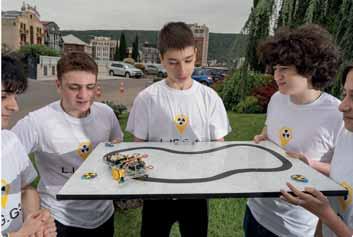
I start at the first table, asking them to tell me briefly about their project. Where did they get the idea, how long did they work, what difficulties did they face? They tell me that their team is called "Firelink"; that they have been working for almost a year; that a network of low-budget stations based on microtechnology and sensors was created for early monitoring of forest fires. They tell me enthusiastically, diligently, clarify the details - every nuance is important. Most likely, it was like that in the process of work.
Then there is "LIGGA" - another team - with the project "Radiation research, monitoring and safety system." The project created by the team makes it possible to control the level of radiation in buildings and determine the area of radiation spread. If you won? - I ask. "Everything will change, we will go to NASA!" "NASA will change everything."
There are five of them: Gega, Irakli, Lizi, Alexander and Giorgi. And they will go to NASA. But they don't know it yet.
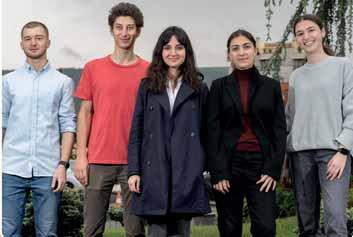
They answer me exhaustively about the project, then everyone else who comes to the project observes and questions whether it will work in real life.
They answer that the Minister of Education and Science, who reviewed the works of the teams together with the American Ambassador, says that the development of technology and natural science education is one of the priorities of the Ministry.
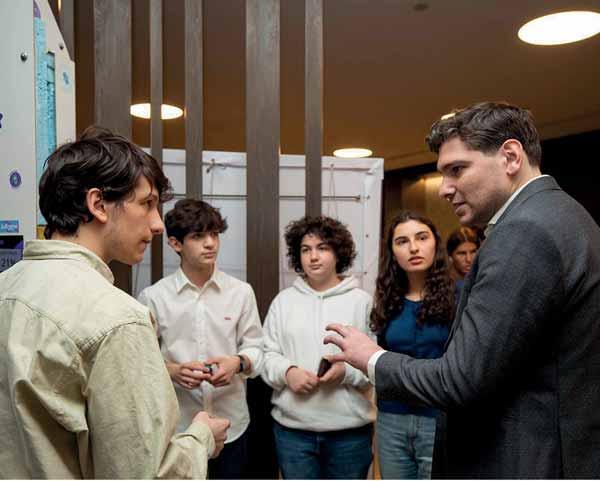
The Millennium Innovation Competition was held for the eighth time this year, with the financial support of the US Embassy. US Ambassador Kelly Degnan met the projects of all 12 finalist teams and said that the Embassy is particularly proud of this competition.
About an hour later, "LIGGA" is named as the winner. The team will go to the USA - to the NASA Space Center University summer school.
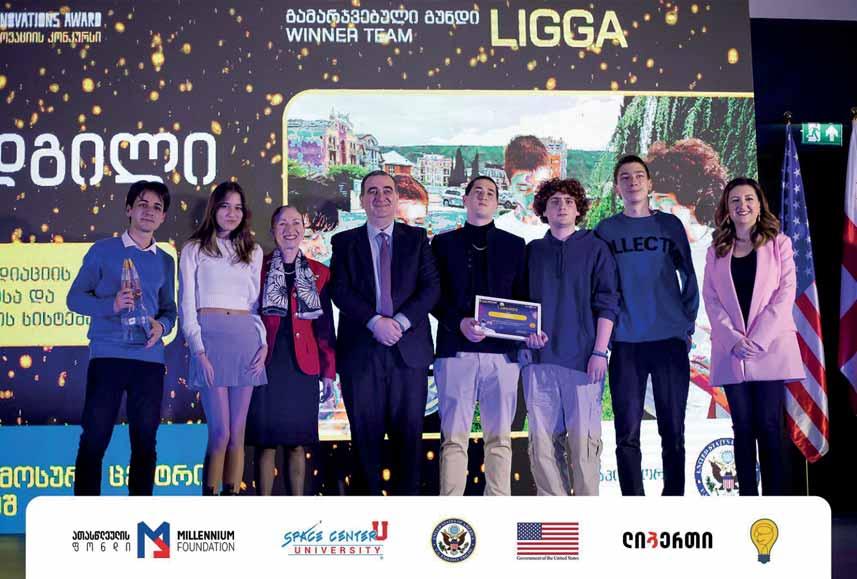
"Firelink" will take second place and will participate in the US’ Stanford University iD Tech camp, with funding from the Georgian Innovation and Technology Agency.
Liberty Bank will send Mad Scientist, the third-placed team, on a study visit to Switzerland, to the European Center for Nuclear Research - CERN. Their project - "Universal Friendly Home"provides an opportunity to remotely control any equipment in the house with

voice commands and voice messages.
Before they go to CERN, they tell us what they have learned about this nuclear research organization. They say the center is partly on the territory of Switzerland and partly on the territory of France - the world's largest laboratory in the physics of elementary particles.
Liberty became an official partner of the Millennium Innovation Competition this year. One of the main priorities of the bank's new strategy is to support education. The competition partnership includes promoting the education of talented, innovative young people, including those living in the regions. Liberty believes that educated youth can change our reality for the better. Accordingly, the bank actively supports projects that motivate future generations to move forward.
Promoting education is a key point of the intersection between Liberty and the Millennium Foundation. The Millennium Innovation Competition aims to encourage innovation and the creation of new technologies among high school students and increase interest in the science and engineering (STEM) fields. More than 2,500 students have already participated in the competition.
They work on innovative projects and then talk about these innovations and technologies with such love that you really, really want to give each of them the opportunity to win, to see, to understand, to be able to reach all the heights.
Because they believe in the power of knowledge. They strive for the freedom that knowledge brings. They believe that NASA will change their whole life.
There have been several arcs in my Georgian life of such significant duration and import that they have changed who I am as a person. One was moving to Svaneti in late 2007, after about eight years of an average three visits a year there from Tbilisi. This one is closed now, or at least closing. Another arc was my marriage to Lali Skhirtladze in the spring of 2009; this, thankfully, is ongoing. It overlaps the “moved to Svaneti” arc too, as she joined me there in 2011.
Another arc is now closed, as of midday on December 6, as I write this. My blood brother and dear friend Nodar Aprasidze, pediatric surgeon, citizen of the Svan village we settled in and thus the reason for that move, has passed away from a stroke, aged 65 and a few weeks.

I met Nodar while running a medical program for Chechen refugee children in Pankisi, Georgia, in 2000. World Concern, an NGO in Tbilisi, had received a $100k anonymous donation stipulated
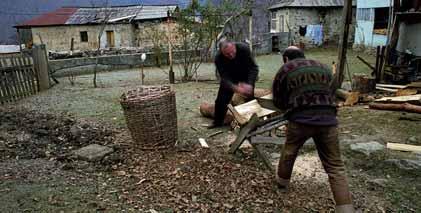
for them. Its leader, knowing me and my interest in the Chechens’ plight as their war for independence from Russia had restarted in 1999, asked me to head up the program. Visiting the Iashvili Children’s Hospital to do with this, I met Nodar, quickly found out that he was a Svan (my other main people group of interest in the Caucasus), and the rest was history.
So many children have passed through his hands and under his scalpel, their lives saved or healed, that I don’t know where to begin. He is a legend.
Nodar is the first person with whom I had a friendship which has moved from one language (Russian) entirely to another (Georgian). He was well travelled in Georgia, and introduced me to many places and people from one end of it to the other. We saw Shatili together, as well as Batumi, and all parts of Svaneti Upper and Lower, especially Lentekhi, Ushguli, Mestia, Becho, Dizi and of course Etseri, his home.
He also saw me go through culture shock in Georgia, as every stop was occasion for a supra (the feast) with its hours of groaning food-laden table and toasting ritual with wine or, if you were unlucky, araki- moonshine. In time, he appointed
me toastmaster, indicating that I had passed his course in the subject.
When introducing me to friends, Nodar would recite an anecdote from our friendship, and these moments of note grew in number with time. His wicked humor allowed him to laugh while telling me, after an early and innocent slip-up of mine, that in Georgian one cannot politely say “Your mother”, only “Mother your”. He also put up with my attempts to stop the automatic throwing of trash out the car’s window, and allowed himself to end this bad habit.
We frequented the Tbilisi Old City bath houses together in winter, a luxury spa treatment of several hours for a song, I having shed my western inhibitions about prolonged nudity some years before in St Petersburg. Once we hopped barefoot and be-toga-ed across the road from the sauna at Lisi Lake and, it being 8 am and empty, proceeded to skinny-dip in the lake.
When I was mugged and robbed of several hundred dollars of medical aid money in a stairwell in 2001, in an apartment block in Krtsanisi, I phoned Nodar upon coming to, and he came and collected me. He then stitched me up in his hospital, and took me to his own apartment to recover, before my Chechen friends claimed me for a week.
Now he lies there as friends and relatives come and go for his wake, to pay respects. Nodar introduced me to death in Georgia, and it has now claimed him. Nodar met my parents and sister when they came for my wedding, was one of my two best men at that event, and had become my blood brother some years before then, my doing, to cement our friendship. I took it upon myself to phone him from every birthday or wedding party of his friends or relatives in Svaneti if he was absent, to connect his people with him. A few seconds’ bedside video from two days ago shows him conscious
and awake, waving a hand in greeting. Now he is unreachable, and I am desolate, though we shared faith in the same God; so this will have to do as hope.
Nodar is survived by his wife Madona, his children Tatia and Lasha, a brother and sister, Seriozha and Tina, and her three children. And mourned by so many people that his funeral (location as yet undecided, Tbilisi or Svaneti) may be the biggest of the many I have attended in Georgia. A toast to you, dear big brother
and friend and teacher.
Tony Hanmer has lived in Georgia since 1999, in Svaneti since 2007, and been a weekly writer and photographer for GT since early 2011. He runs the “Svaneti Renaissance” Facebook group, now with nearly 2000 members, at www.facebook.com/ groups/SvanetiRenaissance/ He and his wife also run their own guest house in Etseri: www.facebook.com/hanmer.house.svaneti
The Ministry of Italian Enterprises and Products issued a commemorative postage stamp dedicated to the 30th anniversary of diplomatic relations between Italy and Georgia.
A postage stamp printed by the Italian State Mint and Polygraphic Institute (circulation: 350,010 pieces, value at “B”
rate: 2.40 euros) shows the Cathedral of Bichvinta painted by the Italian monk, Cristoforo Castelli. The painting is kept in the Municipal Library of Palermo Leonardo Sciascia.
It is no coincidence that the choice stopped on one of the paintings of Cristoforo Castelli, which he created during his almost twenty-five years of living in Geor-
gia in the 17th century – this choice indicates both the intensity and depth of the historical ties between the two countries, as well as the contribution of Italians to the European cultural family in Georgia in getting to know each other better.
“The thirtieth anniversary of the restoration of diplomatic relations between Italy and Georgia is celebrated against
the background of excellent relations in the political, economic, social and cultural spheres and is a good opportunity to look back not only at the path we have traveled together over the last three decades, but also at the centuries-old tradition of friendship and mutual cooperation between the two countries,” stated the Embassy of Italy in Georgia.
At the end of December, the Post Office of Georgia will issue a postage stamp dedicated to the 30th anniversary of diplomatic relations between Italy and Georgia, on which the same painting by Cristoforo Castelli will be depicted. The presentation of both postage stamps released simultaneously will take place on December 27, 2022 in Tbilisi.

The most important project focused on the new generation – “YOUNG ARTIST INTERNATIONAL PROGRAMME”, which is implemented for the purpose of training, education and professional development of young singers, continues. It is within the framework of this program that the Monte Carlo Opera
Theater’s production – Giacomo Puccini’s opera “La Boheme” will be performed in the Tbilisi Opera House.
As a result of the audition, about 20 young Georgian and foreign singers were selected, who took master classes in vocal and stage art with Badri Maisuradze, the artistic director of the Tbilisi Opera Theater.
Young theater conductors Kakhi Solomnishvili and Levan Jagaevi are working on the play. Conductor of the premiere performance – Fabrizio Maria Carminati, artistic director of “TEATRO MASSIMO” named after Vincenzo Bellini in Catania; Carminati’s assistant, the Italian maestro Sirio Scacchetti, has been working intensively with the creative group.
“La Boheme” is directed by Jean-Louis Grinda, head of the Orange Festival and Monte Carlo Theater.
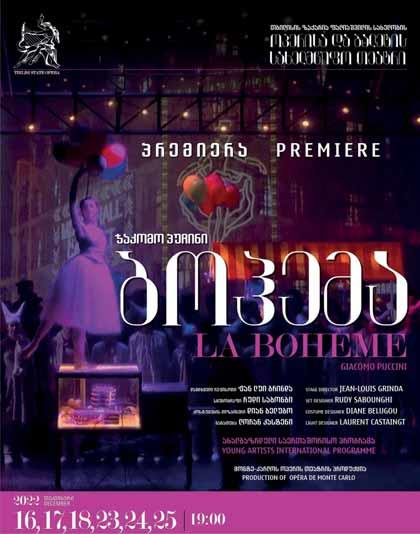
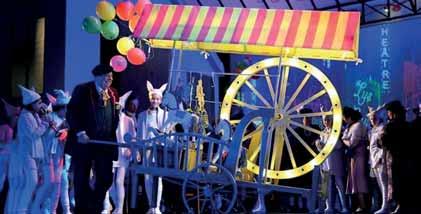
The libretto of “La Boheme” is based on the novel “Scenes from the Life of Boheme” by the French writer Henri Meurget. This work depicts the lives of talented but poor young artists – poets, painters, musicians, who live in the Latin Quarter of Paris. L. Ilika and J. Jakoza wrote the libretto. based on this work. Puccini was so passionate about the work process that he created the
opera in 8 months.
The premiere of “La Boheme” took place in Turin on February 1, 1896, conducted by 28-year-old Arturo Toscanini.
The audience met the performance quite coldly, which made the composer cry.
However, “La Boheme” had great success in Palermo that year, seeing the audience enthralled by both the music and the story. Just two years after the world premiere, Puccini’s “Boheme” was staged at the Tbilisi Opera House, on November 25, 1898, and immediately took its place in the repertoire.
“It is no coincidence that “La Boheme” is considered by critics to be one of the most popular operas. If you are ready to understand what real boheme is and to grasp the life of artists, then we recommend you see this beautiful opera at least once, feel the feelings of the characters, walk through the narrow streets of the Latin quarter of Paris and visit the famous cafe “Momus”. We are waiting for you on December 16, 17, 18, 23, 24, 25 at the Tbilisi Opera and Ballet Theater!” the administration announced.
largely international is the goal now, when being Georgia’s champion is no longer commensurable enough a title.
Incidentally, we should not confuse kickboxing with MMA. Kickboxing is a striking martial art of kicks and punches, whereas MMA (Mixed Martial Arts) is a combination of various martial arts, including kicking, striking, wrestling and grappling. Giorgi Malania is into purely professional kickboxing in the 65kg weight category.
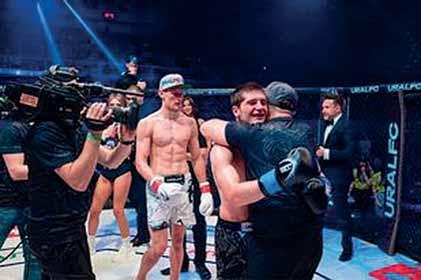 BY NUGZAR B. RUHADZE
BY NUGZAR B. RUHADZE
Georgian kickboxer Giorgi Malania is only 18, and he has already managed to get a 14-0 record under his belt, which means that in the last two to three years he has won 14 official bouts, lost none, and accepted no ties. The young man looks like a regular kid, just 174 centimeters in height and 65 kilos in weight, with no oversized muscles or swollen blood vessels. At first sight, one might even wonder where he gets his strength from. And that’s exactly the trick: at his extraordinarily young age, he has achieved a level of mastery which amazes both fans and experts alike, including his international-level promoters, sponsors and managers Soslanbek Izrailov and Marcel Wright, which operate in various countries. Going

Giorgi’s parents are originally from Abkhazia, and his paternal grandparents are still living in the famous Gali region.
The boy says he has been infatuated with kickboxing since the age of six, when he used to watch movies on martial arts nonstop, and utilized the walls of his house as a target to kick, but the main prerequisite that turned him into a fighter is his first coach, G. Pilashvili’s attitude towards little Giorgi, seeing him treating the boy with unmitigated fatherly care and affection, and patiently and methodically instilling in him a love for sport in general and for kickboxing in particular.
As Giorgi was growing up, his talent and skills became more and more noticeable, then new coaches came, Mamuka Shonia and Bachuki Partsvania, taking up the future star’s sporting fate in their strong and skillful hands, training him up, and watching the process of his morphing into a genuinely valiant and strong-willed fighter.
Giorgi Malania’s gentlemanly charac-
PUBLISHER & GM George Sharashidze
COMMERCIAL DEPARTMENT Commercial Director: Iva Merabishvili Marketing Manager: Natalia Chikvaidze
EDITORIAL DEPARTMENT: Editor-In-Chief: Katie Ruth Davies
ter, mild temper, humble disposition and respectful attitude towards the people in his sporting milieu help me imagine the family situation in which he grew up together with his elder brother of 25 and younger sister of 12. The three of them have always lived in a familial environment of mutual worship and adoration, emulating their wonderful parents. And this is very important to emphasize in terms of creating the picture of Giorgi’s future career in the sport of swift, sturdy and undaunted personalities.
On a strict diet and being an absolute teetotaler, Alania spends most of his time at his beloved gym in Gldani, Tbilisi. He is certainly into intensive training, and only his perseverance keeps him up and going at all times. Giorgi is a dedicated churchgoer and a great art lover, which contributes a lot to his image as a good athlete. His international career is in the making, his having fought only in countries like Russia, Turkey, Estonia and Armenia, but all is in store for him. He is in expectation of some fights in the near future, seeing him faithfully and passionately getting ready for upcoming international competitions.
All the forecasts around are in Giorgi Malania’s absolute favor. The predictions come from his foreign managers, his local coaches, and Georgian kickboxers like the famous Davit Kiria, all of them being very credible, based on their titles and experience. Incidentally, in 2021, Kiria organized the Maxfight Grand Prix
Journalists: Ana Dumbadze, Vazha Tavberidze, Tony Hanmer, Emil Avdaliani, Nugzar B. Ruhadze, Michael Godwin, Ketevan Skhirtladze, Mariam Mtivlishvili, Erekle Poladishvili
Photographer: Aleksei Serov
Contest, in which Giorgi scored two fights: He won the first one by points and the second by a dexterous knockout.
Giorgi says what matters first and utmost in achieving victory is tireless hard work. Yes, indeed, it is the lucky mixture of talent and labor that makes things possible in big sports, but it is also true that nothing considerable will happen without the relevant financial support. Take, for example, the judo culture in Georgia, which has developed in this country on the level of world class. The same might happen with kickboxing here. As Giorgi noted during our lengthy and meaningful conversation, there are
Website Manager/Editor: Katie Ruth Davies
Layout: Misha Mchedlishvili Webmaster: Sergey Gevenov
Circulation Managers: David Kerdikashvili, David Djandjgava
ADDRESS
1 Melikishvili Str. Tbilisi, 0179, Georgia
many kids, sweating in his and other gyms in town, who look and sound very promising, and not only ethnic Georgians. Nowadays, there are people of various nationalities swarming into this city of warmth, peace and understanding, where former irreconcilable enemies make friendships and live together. There might be future masterful kickboxers among them, too, Giorgi’s future friends and rivals in upcoming local bouts or great international competitions. This is exactly the idea our incipient glittering kickboxing star Giorgi Malania is building his athletic career on. Good luck to this golden kid!
Tel.: +995 32 229 59 19
E: info@georgiatoday.ge
F: GeorgiaToday
ADVERTISING & SUBSCRIPTION
+995 555 00 14 46
E-mail: marketing@georgiatoday.ge
Reproducing material, photos and advertisements without prior editorial permission is strictly forbidden. The author is responsible for all material. Rights of authors are preserved. The newspaper is registered in Mtatsminda district court.
